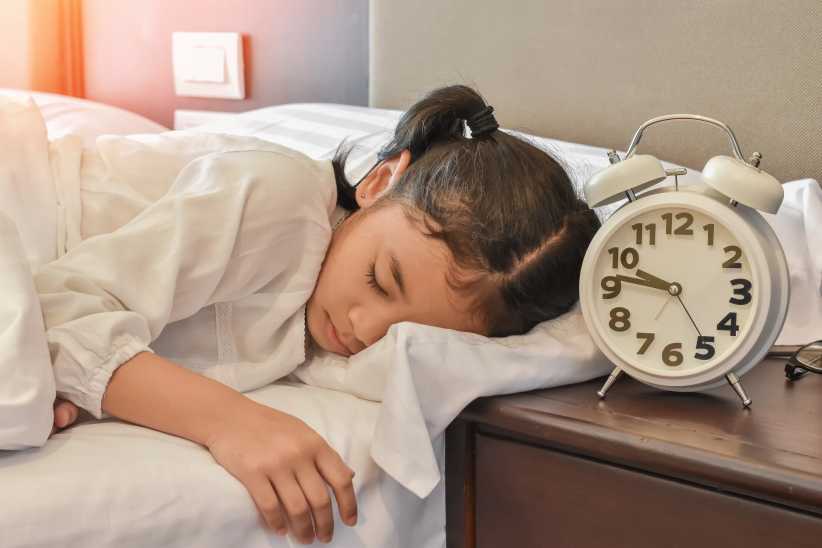
How to Reset Your Child’s Sleep Schedule for Back-to-School: Tips for Better Sleep
After a summer of late bedtimes and slow mornings, getting kids back on a school sleep schedule can definitely be a challenge. But easing them into a healthy routine now can make those early wake-ups a whole lot easier for everyone.
We spoke with Dr. Kelechi C. Ngwangwa, a board-certified pediatrician at Family Health Centers at NYU Langone Health and Clinical Assistant Professor in the Department of Pediatrics at NYU Grossman School of Medicine, to get her top tips on adjusting your child’s sleep habits, avoiding bedtime battles, and making sure they’re getting the rest they need to thrive in the classroom.
With school starting next week, what’s the best way for parents to start shifting their child’s sleep schedule now?
Start by setting a consistent wake-up time every day, including weekends. When your child wakes up earlier, their bedtime will naturally move to an earlier time, making it easier for them to fall asleep. You can make waking up more appealing by planning a fun morning activity, serving a favorite breakfast, or making special family plans.
It is also important to keep regular mealtimes, playtimes, and naps. All these steps help set the tone to begin a calming bedtime routine. The bedtime routine should start 1-2 hours before sleep and can include giving your child a bath, reading a story, talking about their day, or playing soft music to help them relax.
Psst… Check Out How to Beat the Back-to-School Blues
Many kids have been going to bed late and sleeping in all summer. What’s the most effective way to reverse that pattern without it becoming a daily struggle?
To help your child shift away from late bedtimes and sleeping in during the summer, encourage more physical activity during the day. This helps them feel naturally tired and ready for sleep at an appropriate bedtime. Try to keep your child’s bedtime and wake time consistent on both weeknights and weekends. This steady schedule helps their internal clock adjust without turning bedtime into a power struggle.
What are some things we shouldn’t do or things that might backfire?
Avoid getting into power struggles with your child over bedtime. This can make the process more stressful for everyone. Also, try not to engage in stimulating activities close to bedtime, such as active play or screen time, because these can make it harder for your child to settle down and fall asleep. Avoid screen time or anything that might stimulate them. Helping your child find ways to calm their mind and body can make it easier for them to drift off naturally.
What role do screens, mealtimes, and physical activity play in helping kids adjust their internal clocks for school?
Regular mealtimes and physical activity help regulate your child’s internal clock. Being active during the day helps them feel tired at night, and consistent meal schedules help their body
develop the expectation of food and rest. Together, these habits support a smooth transition to an earlier sleep schedule for school. Avoid giving your child food and drinks with caffeine, such as soda, tea, chocolate, or coffee. Children are especially sensitive to caffeine, and it can disrupt their sleep. It is also important to monitor screen time, especially in the hours before bedtime. Too much screen exposure can delay sleepiness.
What can parents do if their child is lying in bed but just can’t fall asleep yet?
If your child is in bed but struggling to fall asleep, encourage them to try some relaxing, quiet activities that won’t overstimulate their brain. Some activities may include taking slow, deep breaths together, listening to calming music, reading a gentle bedtime story, or doing gentle stretches.
How many hours of sleep do children and teens need during the school year, and what are some signs they’re not getting enough?
Children and teens need different amounts of sleep depending on their age:
Preschoolers (3-5 years old): 10–13 hours of sleep each night
School-age children (6-12 years old): 9–12 hours of sleep each night
Teens (13-18 years old): 8–10 hours of sleep each night
If your child is not getting enough sleep, you may notice some of these signs: difficulty waking up, increased irritability, trouble focusing in school, or falling asleep during class.
Kelechi C. Ngwangwa, MD, is a board-certified pediatrician at Family Health Centers at NYU Langone Health and a Clinical Assistant Professor in the Department of Pediatrics at NYU Grossman School of Medicine. She provides primary care for children from infancy to adolescence, including checkups, immunizations, and treatment for common childhood illnesses. Dr. Ngwangwa earned her medical degree from SUNY Downstate and completed her pediatric residency at the Cohen Children’s Medical Center.
Psst… Check Out Free Backpacks and School Supplies for NYC Students in Every Borough














